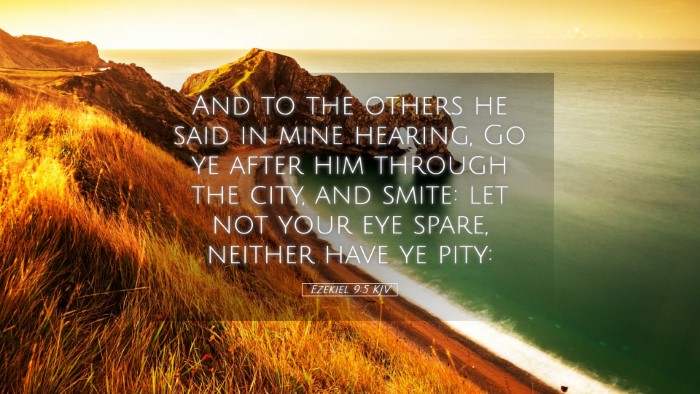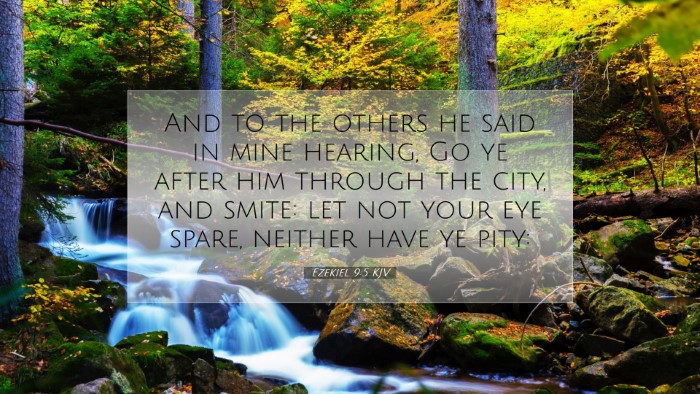Commentary on Ezekiel 9:5
Ezekiel 9:5 states:
“And to the others he said in my hearing, ‘Go through the city and strike down; do not let your eye spare, and do not have pity.’”
Introduction
The prophecy of Ezekiel is imbued with profound themes of judgment, restoration, and the sovereignty of God over His people. In the context of Ezekiel 9, we encounter a moment of divine judgment upon the unfaithful in Jerusalem. This verse depicts a critical decree of God regarding the fate of those who have turned away from Him.
Contextual Analysis
The overarching narrative within Ezekiel 9 is set against the backdrop of the impending destruction of Jerusalem. Therefore, as we analyze verse 5, it is crucial to consider the surrounding verses and the theological implications they hold.
- Ezekiel’s Vision: The chapter opens with Ezekiel witnessing a vision where he sees the glory of God leaving the temple, symbolizing His impending judgment upon a faithless generation.
- The Role of the Man with the Writing Kit: The initial verses highlight a man tasked with marking the righteous in Jerusalem, indicating God’s mercy in the midst of judgment.
Theological Implications of Judgement
This verse serves as a stark reminder of God’s absolute justice. Here, the command given to the others to execute divine judgment reflects several key theological themes:
- Divine Justice: God does not overlook sin; the striking down of those unmarked symbolizes the consequences of rejecting His covenant.
- The Severity of God's Wrath: The instruction to 'strike down' is not just a physical act but a spiritual statement about the serious nature of sin and its repercussions.
Insights from Public Domain Commentaries
Matthew Henry
Matthew Henry emphasizes that the command to strike down is indicative not only of temporal judgment but also serves as a foreshadowing of the eternal consequences of sin. He suggests that God’s justice is often executed through instruments of His providence, and in this context, the executioners represent divine authority tasked with maintaining holiness and order.
Albert Barnes
Albert Barnes interprets verse 5 with a focus on the refusal to show pity as a reflection of the seriousness of transgression. He notes that God's commands to spare no one signal the unwavering integrity of divine justice. This theme resonates throughout the prophetic literature, where God’s patience is eventually met with decisive action against persistent unbelief.
Adam Clarke
Adam Clarke elaborates on the psychological aspect of this command by suggesting that the sheer gravity of the directive—striking down without pity—implies an emotional detachment associated with divine orders. Clarke correlates this with the attributes of God: in His justice, there exists a profound seriousness that must never be underestimated.
Application for Modern Believers
This verse holds significant implications for contemporary readers, especially pastors and theologians:
- Understanding God’s Holiness: This text challenges believers to comprehend the holiness of God and His intolerance towards sin, inviting deeper reflection on personal and communal faithfulness.
- Fear of the Lord: The weight of divine judgment should instill a healthy 'fear of the Lord' (Proverbs 1:7), motivating believers to pursue righteousness.
- Call to Witnessing: The context of God’s justice serves to galvanize the church towards the Great Commission—spreading the gospel to avert spiritual judgment.
Conclusion
Ezekiel 9:5 is a piercing reminder of God's sovereign right to judge His people. It beckons spiritual leaders to engage with the complexities of God's character—balancing His love and mercy with His righteousness and justice. The insights gained from this passage, enriched by the comments of profound scholarly voices through the centuries, continue to resonate today, encouraging us to uphold truth and pursue holiness.


